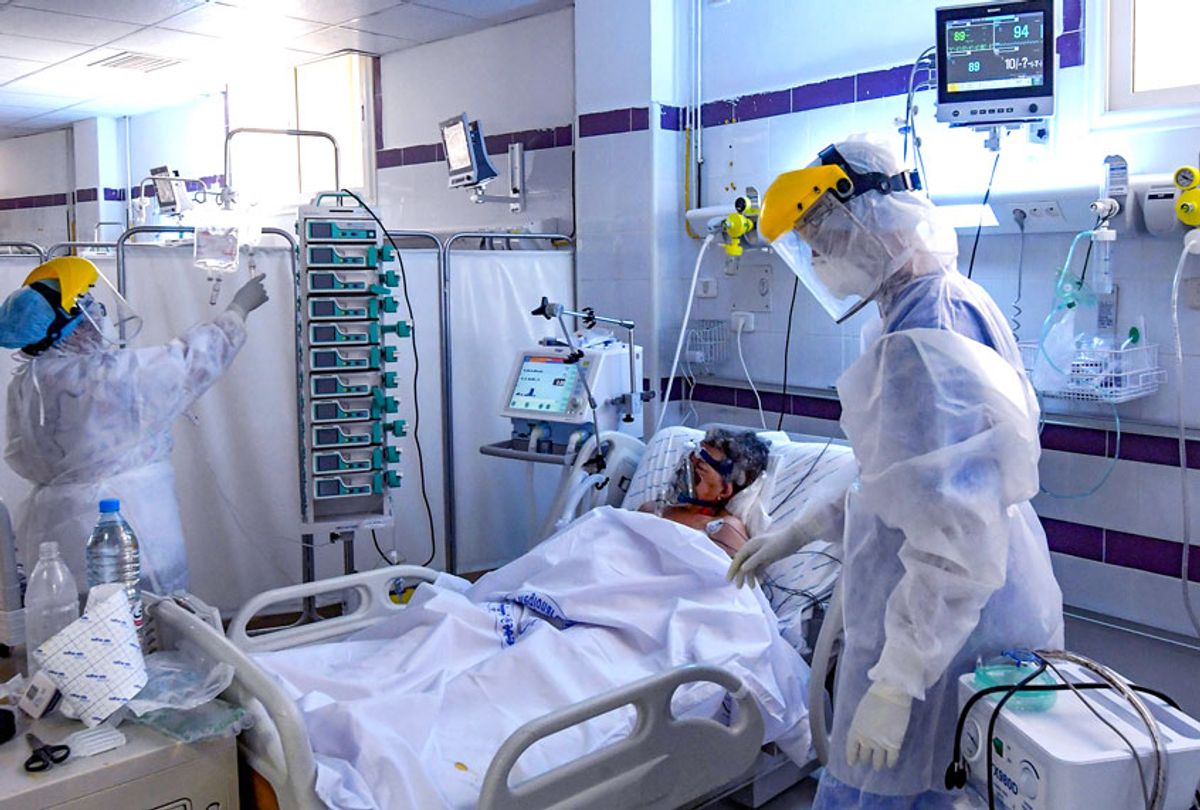For those hospitalized with severe COVID-19, there is a last-resort treatment available that has been shown to save their lives. Extracorporeal membrane oxygenation, often referred to as ECMO (pronounced ek-mo), oxygenates blood outside the body in a machine, giving the heart and lungs a chance to rest when a patient is experiencing lung failure.
The treatment essentially buys time for a person's lungs to heal. But due to the treatment being so resource-intensive, as it requires a specialized machine and personnel who know how to operate it, it is not always available at every hospital. This was particularly pronounced during the COVID-19 pandemic, when a lack of access to ECMO almost certainly cost lives.
According to a study published in the American Journal of Respiratory and Critical Care Medicine, nearly 90 percent of severe COVID-19 patients who qualified for ECMO, but were unable to receive the treatment, died — compared to a 43% mortality rate for patients who received ECMO. Both groups were young in age (the median age was 40 years old) and had limited comorbidities.
The analysis was led by a team of researchers at Vanderbilt University Medical Center (VUMC), looking at the total number of patients referred for ECMO in one referral region between Jan. 1, 2021, and Aug. 31, 2021. The sample size of patients analyzed was small, 240 patients, but the analysis showed just how many lives could have been saved if ECMO treatment was available: 49 of the 55 patients (89.1%) who didn't receive ECMO died, compared to 15 of the 35 patients (42.9 %) who received the treatment.
Want more health and science stories in your inbox? Subscribe to Salon's weekly newsletter The Vulgar Scientist.
"Because some patients die despite receiving ECMO, there has been debate about how much benefit it provides. This study shows the answer is a huge benefit," said senior author Jonathan Casey, MD, assistant professor of Medicine at VUMC. "This data suggests that, on average, providing ECMO to two patients will save a life and give a young person the potential to live for decades."
The patients were unable to receive the ECMO treatment due to a shortage of resources, on top of the fact that even in non-pandemic times, ECMO machines and personnel aren't always easy to find. But why?
Whitney Gannon, MSN, director of Quality and Education for VUMC and lead author of the study, told Salon there are a few reasons why ECMO treatment isn't offered in every hospital. First, it's a specialized device that's more high-tech than other devices that are offered in intensive care units (ICU). It can also be considered a more high-risk kind of treatment.
"The specialists providing the ECMO care have to really understand the technical aspects of the device, and that takes a good bit of training," Gannon said. "The doctors have to be able to understand how to care for their patients safely with the device and have to understand how all the ICU therapies work together with the ECMO machine, and so that requires extensive training."
Gannon explained that means more training for all personnel in the ICU.
"You're talking about more dedicated personnel," Gannon said."And there have to be technical specialists who are able to attend to the machine."
RELATED: What it feels like to survive COVID-19's dreaded "cytokine storm"
Sometimes, Gannon said, an ECMO machine can have an issue that a specialist needs to know how to technically solve.
"ECMO patients who receive ECMO, especially those who have COVID, are often on ECMO for long periods of time, longer than what we've seen historically, and so therefore, they're taking up an ICU bed, ICU nursing staff and ICU resources for longer," Gannon said. "So it's just a huge lift in all different aspects of the hospital, and frankly, that's why a lot of hospitals don't have ECMO."
Amesh Adalja, an infectious disease doctor and critical care medicine doctor, who was not involved in the study, agreed that the barrier to ECMO isn't necessarily about a lack of funding, but the resources available.
"It's not about investment in capital — it's about having the resources and expertise to deploy ECMO," Adalja said. "Often ECMO is available at hospitals that perform cardiac surgery because ECMO is used routinely during many of those surgeries."
Adalja added that it can be difficult for hospitals to offer when inundated with patients, especially if the hospital is already strapped for resources.
According to NPR, children's hospitals always provide ECMO because it is often used on newborns who are having trouble with their lungs. Most major medical centers have them, too. Yet that leaves many rural hospitals without them or far from a place that can offer the treatment. There is also no formal way to make transfers to a medical center for ECMO either.
Gannon said she hopes that their study will encourage government agencies and more medical centers to "invest in infrastructure for ECMO."
"And ECMO isn't just having the machines, but it's having the specialized personnel to take care of the patients, to have the ICU bed, to actually prioritize these patients, to prioritize ECMO and to think about resource allocation and better regional coordination and sharing of resources," Gannon said.
Read more on COVID-19:



Shares